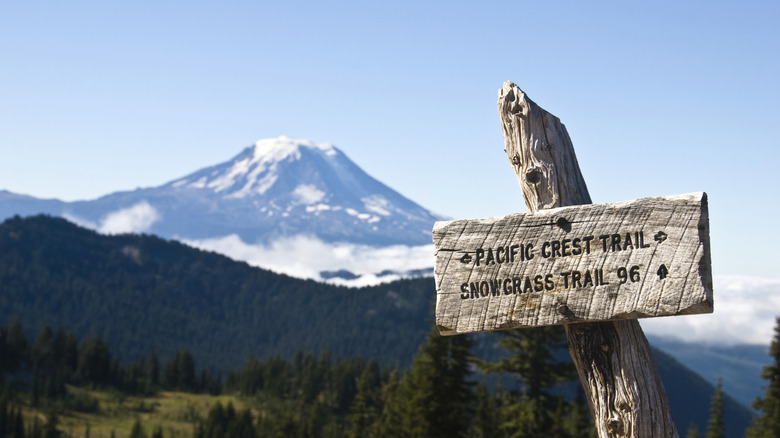Thru-hiking, the practice of backpacking an entire long-distance trail in a single season, lures in adventurers with a sweet song of physical challenge and communion with nature. Hikers undertake grueling daily treks, often covering 16 and 24 miles on average, for about four to six months, all while carrying heavy packs filled to the brim with essentials like gear and food. Of course, if you’ve ever done this type of hiking, you know how to pack the best (and safest) hiking gear. The draw lies in the health benefits: improved cardiovascular function, stronger muscles, enhanced balance, and emotional relief from nature’s calming essence. A 2015 study from Stanford University highlights how hiking can boost mood, reduce stress, and alleviate anxiety and depression while sharpening sensory perception and fostering relationships.
Among the most iconic and best long-distance and thru-hiking trails are the Pacific Crest Trail (PCT) and the Appalachian Trail (AT). The PCT stretches 2,650 miles from the U.S.-Mexico border to the U.S.-Canada border, traversing deserts, mountains, and forests with a total elevation change of about 155 miles. Hikers face extreme temperatures, high altitudes, and intense exposure to the sun, all while consuming highly caloric diets to sustain the average of 5,000 calories needed per day. The AT, which spans about 2,190 miles from Georgia to Maine, winds through the scenic woodlands and rugged terrain of the East Coast of the U.S. Both trails demand extraordinary endurance, with only a small fraction of the millions who visit completing the full journey each year. Yet beneath the triumphs of thru-hiking lies a darker side: Prolonged extreme exercise paired with poor nutrition can trigger health declines, including bone density loss, mirroring the physiological toll of space travel.
The hidden costs of thru-hiking
A case study published in the National Library of Medicine examined a highly fit 25-year-old male who completed the PCT in 112 days, hiking about 27 miles a day while consuming on average 5,500 calories of largely nutrient-poor food such as fast food (burgers, pizza, etc.). The study aimed to assess how extreme exercise (but a poor diet) affects health markers like heart function, body composition, and bone mineral density. Results revealed a decline in vascular endothelial function, suggesting impaired heart health, meaning reduced blood flow through your arteries that carry oxygen-rich blood throughout the body. It also showed a significant reduction in bone mineral density, which is a reflection of the strength and resilience of your bones. The rate of bone loss on the trial exceeded what would typically occur in a young adult over the same period of time, potentially showing that high volumes of exercise don’t offset the detrimental effects of poor nutrition. The findings suggest that the combination of intense physical demands and inadequate nutrient intake might lead to lasting negative health effects.
Another 2023 study reported similar risks in a 55-year-old male PCT hiker, noting a decrease in body mass, fat mass, and energy availability, alongside reduced bone mineral density. This hiker showed signs of Relative Energy Deficiency in Sport (RED-S), a condition where the body prioritizes vital functions over non-essential ones, like bone remodeling, leading to accelerated bone loss. Thru-hiking’s average of 5,000 calories a day requirement often relies on foods that have little nutritional value (but high calories), which can compound energy deficits and increase the risk of chronic injuries like stress fractures. These findings highlight the need for hikers to approach such endeavors with caution, particularly those with pre-existing artery or bone health concerns.




